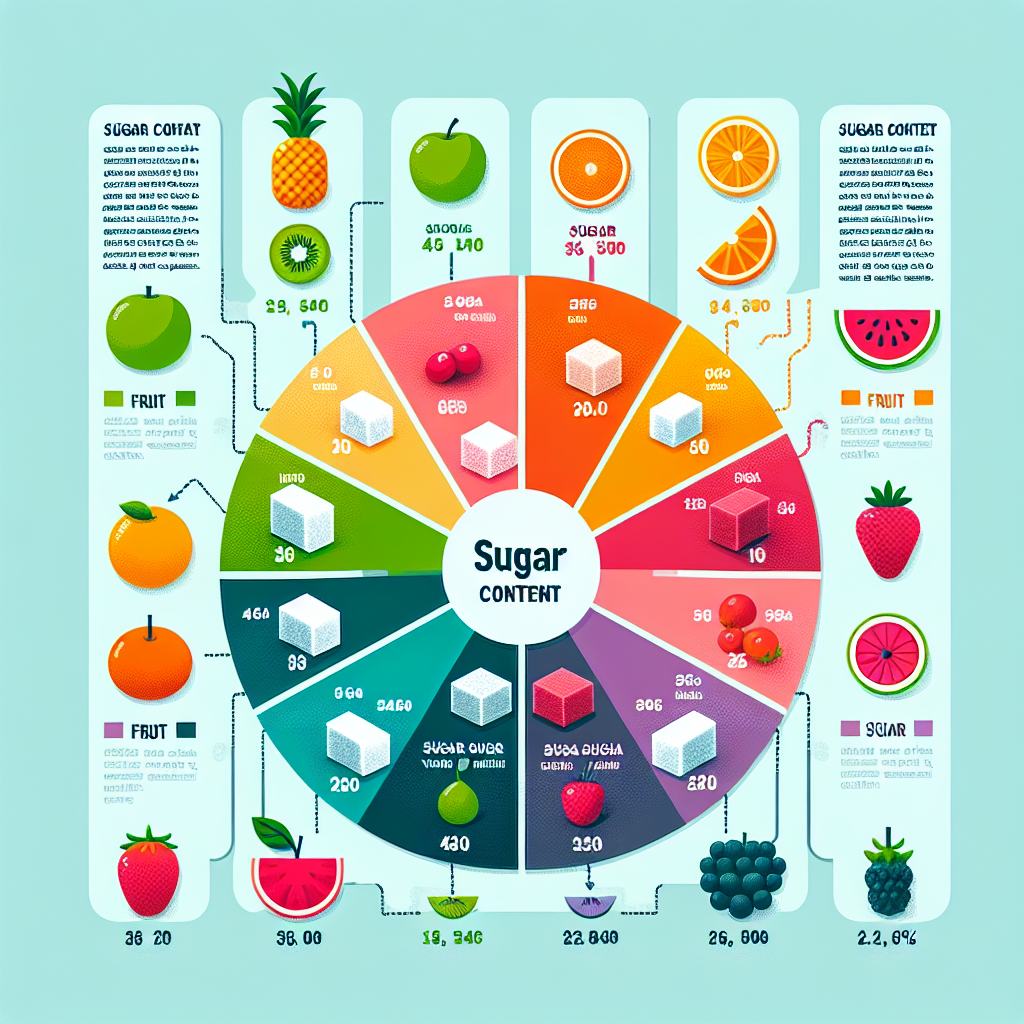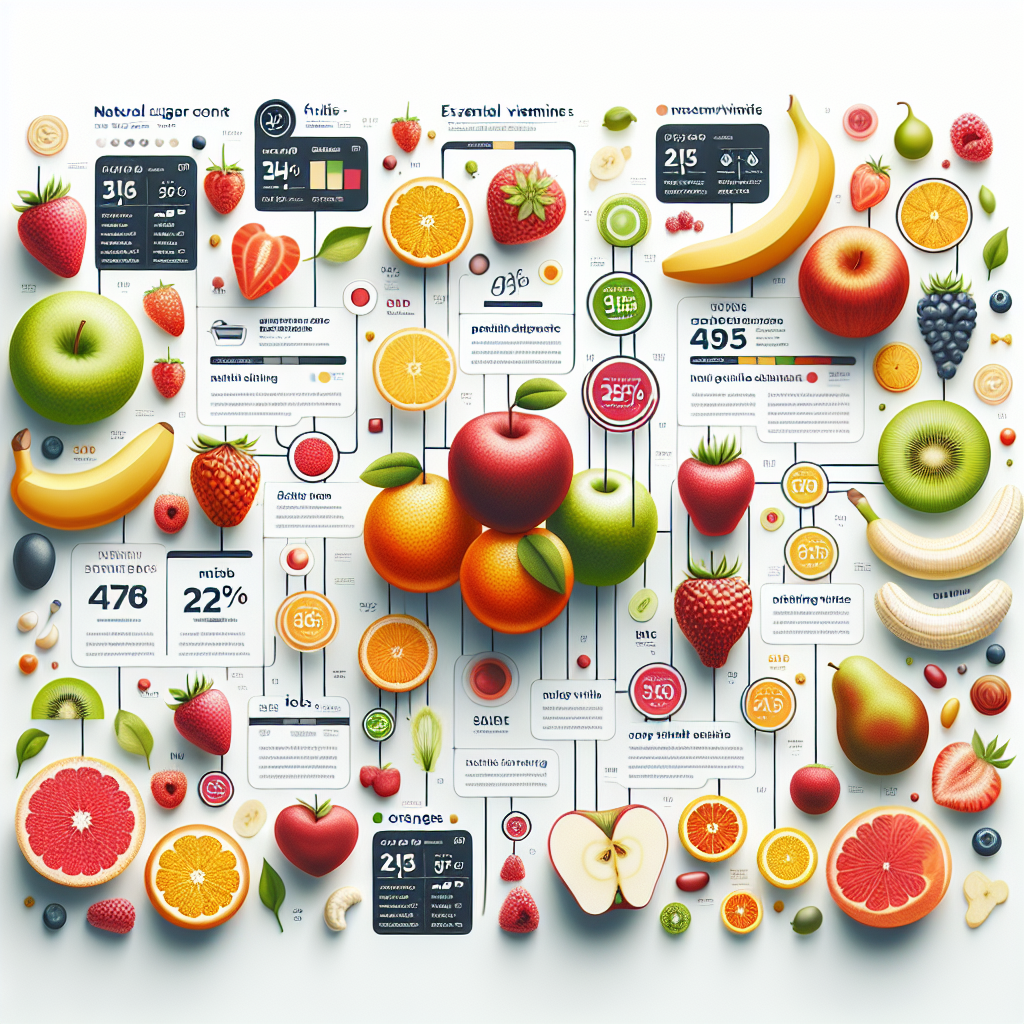Did you know that not all sugars are created equal, especially when it comes to the sugars found in fruits? In this article, we will explore the fascinating world of fruit sugars and uncover which fruit holds the crown for having the healthiest sugar. So, get ready to embark on a sweet journey of discovering the hidden secrets behind the delectable sugars found in your favorite fruits!

Understanding Different Types of Sugars
Natural vs. Added Sugars
When it comes to understanding the types of sugars, it’s important to differentiate between natural sugars and added sugars. Natural sugars are those that occur naturally in foods, such as fruits, vegetables, and milk. These sugars are accompanied by other beneficial nutrients like fiber, vitamins, and minerals. On the other hand, added sugars are those that are added to processed foods and beverages during manufacturing or preparation. Added sugars provide empty calories without any additional nutritional value.
Fructose vs. Glucose vs. Sucrose
Fructose, glucose, and sucrose are three common types of sugars found in various foods. Fructose is a natural sugar found in fruits, honey, and some vegetables. It has a sweet taste and a high glycemic index, meaning it can cause a rapid increase in blood sugar levels. Glucose, also known as blood sugar, is the primary source of energy for the body. It can be found in foods like bread, pasta, and potatoes. Sucrose, commonly known as table sugar, is a combination of fructose and glucose. It is often added to processed foods to enhance their flavor.
Effects of Different Types of Sugars on Health
The effects of different types of sugars on health can vary. Natural sugars, like those found in fruits, are generally considered healthier options due to their accompanying nutrients and fiber. These sugars are slowly digested, resulting in a slower release of glucose into the bloodstream and avoiding sudden spikes in blood sugar levels. Added sugars, on the other hand, have been linked to various health problems such as obesity, type 2 diabetes, and heart disease. These sugars provide empty calories and can lead to weight gain and other negative health effects when consumed excessively.
The Importance of Choosing the Right Sugar
Impact of Excessive Sugar Consumption
Excessive sugar consumption can have detrimental effects on your health. Regularly consuming high amounts of added sugars can contribute to weight gain, increased risk of chronic diseases, and poor dental health. It is important to be mindful of your sugar intake and make healthier choices to minimize the negative impact on your overall well-being.
Choosing Low-Glycemic Index Fruits
Low-glycemic index fruits are those that have a smaller impact on blood sugar levels compared to high-glycemic index fruits. By choosing low-glycemic index fruits, you can enjoy the natural sweetness of fruits while avoiding rapid spikes in blood sugar. Some examples of low-glycemic index fruits include berries, cherries, apples, and pears.
Benefits of Consuming Fruits as a Source of Sugar
Consuming fruits as a source of sugar not only provides natural sweetness but also valuable nutrients that are beneficial for your health. Fruits are rich in vitamins, minerals, and fiber, which are essential for proper bodily functions. Additionally, fruits contain antioxidants that help protect your cells from damage caused by harmful free radicals. By incorporating fruits into your diet, you can satisfy your sweet tooth while nourishing your body with essential nutrients.

Measuring the Sugar Content in Fruits
Understanding Grams of Sugar in Fruits
Understanding the grams of sugar in fruits can help you make informed decisions about your sugar intake. The sugar content in fruits is measured in grams per serving. It is important to note that the sugar found in fruits is natural sugar and not added sugar. While fruits contain natural sugars, they also contain fiber, which helps slow down the absorption of sugar into the bloodstream. This mitigates the negative effects of sugar consumption compared to added sugars found in processed foods.
Recommended Daily Sugar Intake
The American Heart Association recommends limiting added sugar intake to no more than 25 grams (6 teaspoons) per day for women and 36 grams (9 teaspoons) per day for men. It is important to note that this recommendation refers to added sugars and not the natural sugars found in fruits. However, it is still important to be mindful of your overall sugar intake, including both natural and added sugars, to maintain a balanced and healthy diet.
Interpreting Nutrition Labels
Interpreting nutrition labels can help you determine the amount of sugar in a particular fruit or food product. Look for the “total sugar” value and compare it to the serving size to calculate how much sugar you would be consuming. Additionally, check the ingredients list for any added sugars, which may be listed under different names such as high-fructose corn syrup, cane sugar, or maltose. Being aware of the sugar content in your food choices can enable you to make informed decisions that align with your health goals.
Fruit with the Lowest Sugar Content
Lemons
Lemons are known for their tangy flavor and low sugar content. They are a great addition to beverages, dressings, and marinades, adding a refreshing twist without adding excessive sugar. Lemons are also an excellent source of vitamin C, antioxidants, and fiber, making them a healthy choice for flavoring your meals and beverages.
Limes
Limes, like lemons, have a sour taste and contain minimal sugar. They are commonly used in various cuisines to add a tangy and refreshing flavor. Limes are rich in vitamin C and antioxidants, which can strengthen the immune system and promote overall health. Whether you squeeze lime juice over your salad or use it to flavor your water, you can enjoy its zesty taste without worrying about high sugar content.
Raspberries
Raspberries are a delicious and nutritious fruit with relatively low sugar content. They are packed with vitamins, minerals, and antioxidants, making them an excellent choice for a healthy snack. Raspberries also provide dietary fiber, which can aid in digestion and help maintain a healthy weight. Whether eaten fresh or added to smoothies or yogurt, raspberries are a tasty option that won’t overload you with sugar.
Blackberries
Blackberries are another berry that is low in sugar and high in nutrients. They are an excellent source of antioxidants and vitamins, particularly vitamin C. Blackberries also offer dietary fiber, which can help regulate blood sugar levels and promote healthy digestion. Whether eaten on their own or added to cereals or salads, blackberries provide a burst of flavor without excessive sugar.

Fruits with Moderate Sugar Content
Strawberries
Strawberries are a popular fruit known for their vibrant color and sweet taste. They have a moderate sugar content but are still lower in sugar compared to many other fruits. Strawberries are rich in antioxidants and vitamin C, which can boost your immune system and support overall health. Whether enjoyed as a standalone snack, added to salads, or blended into smoothies, strawberries are a nutritious choice.
Watermelon
Watermelon is a refreshing and hydrating fruit that contains a moderate amount of sugar. While it may be higher in sugar compared to lemons or limes, it is still a healthier option compared to many processed snacks and desserts. Watermelon is also rich in vitamins A and C, and it has a high water content, making it a great choice for quenching your thirst while enjoying a naturally sweet treat.
Papaya
Papaya is a tropical fruit that offers a sweet and juicy taste with a moderate sugar content. It is an excellent source of vitamin C, folate, and fiber. Papaya also contains an enzyme called papain, which aids in digestion. Enjoy papaya on its own, add it to fruit salads, or blend it into smoothies for a tropical twist without consuming excessive sugar.
Kiwi
Kiwi, with its vibrant green flesh and unique flavor, is another fruit with moderate sugar content. It is packed with vitamins, minerals, and antioxidants, including vitamin C, vitamin K, and vitamin E. Kiwi also contains fiber, which aids in digestion and promotes a healthy gut. Sliced kiwi can be enjoyed on its own, added to salads, or used to garnish desserts and smoothie bowls.
Fruits with Higher Sugar Content
Mango
Mango is a tropical fruit known for its sweet and juicy flavor. While it may have a higher sugar content compared to some other fruits, it is still a nutritious choice when consumed in moderation. Mangoes are rich in vitamins A and C, as well as dietary fiber. They can be enjoyed on their own, added to salads, or blended into smoothies for a delicious tropical treat.
Banana
Bananas are a popular and easily accessible fruit that is higher in sugar compared to some other fruits. However, they are also a good source of essential nutrients like potassium, vitamin C, and vitamin B6. Bananas can be enjoyed on their own, added to smoothies, or used as a natural sweetener in baking recipes. While they are higher in sugar, they can still be part of a balanced diet when consumed in moderation.
Grapes
Grapes, whether green, red, or purple, are fruits that are relatively high in sugar. However, they still offer various health benefits when consumed in moderation. Grapes are rich in antioxidants and vitamins, particularly vitamin C. They are also a good source of hydration, fiber, and natural sugars. Enjoy grapes as a standalone snack or add them to salads and fruit bowls for a burst of sweetness.
Pineapple
Pineapple is a tropical fruit with a sweet and tangy flavor. It is higher in sugar compared to some other fruits but can still be enjoyed as part of a balanced diet. Pineapple is a good source of vitamin C, manganese, and bromelain, an enzyme that aids in digestion. Savor pineapple on its own, add it to fruit salads, or use it as a topping for grilled meats or pizza for a burst of tropical sweetness.

Health Benefits of Fruits with Low Sugar
Rich in Antioxidants
Fruits with low sugar content, like lemons, limes, raspberries, and blackberries, are rich in antioxidants. Antioxidants help protect your body against free radicals, which are unstable molecules that can cause damage to cells. By incorporating antioxidant-rich fruits into your diet, you can support your body’s defense system and promote overall health.
High in Fiber
Fruits with low sugar content also tend to be high in fiber. Fiber is important for maintaining a healthy digestive system and promoting regular bowel movements. It can also help regulate blood sugar levels and contribute to satiety, keeping you feeling fuller for longer. By choosing fruits with high fiber content, you can support healthy digestion and manage your sugar intake.
Promote Weight Loss
Fruits with low sugar content are often lower in calories compared to fruits with higher sugar content. This makes them a great option for those looking to lose or maintain weight. The fiber in these fruits helps increase feelings of fullness, reducing the chances of overeating. Incorporating low-sugar fruits into your diet can help satisfy your sweet cravings while supporting your weight loss goals.
Boost Immune System
Many fruits with low sugar content, such as lemons, limes, and berries, are packed with vitamin C. Vitamin C is known for its immune-boosting properties and plays a vital role in maintaining a healthy immune system. By incorporating these fruits into your diet, you can provide your body with essential nutrients that can help fight off infections and promote overall well-being.
Nutritional Value of Fruits with Moderate Sugar
Vitamin C Content
Fruits with moderate sugar content, such as strawberries, watermelon, papaya, and kiwi, are excellent sources of vitamin C. Vitamin C is essential for the growth, development, and repair of body tissues. It also acts as an antioxidant, protecting your cells from damage and supporting your immune system. By consuming these fruits, you can increase your vitamin C intake and reap the associated health benefits.
Hydration Benefits
Watermelon, a fruit with moderate sugar content, has high water content. This makes it an excellent choice for staying hydrated, especially during hot summer months. Proper hydration is essential for maintaining bodily functions, regulating body temperature, and promoting overall health. Incorporating watermelon into your diet is a refreshing way to increase your fluid intake.
Improving Digestion
Papaya, a fruit with moderate sugar content, contains an enzyme called papain. Papain aids in digestion by breaking down proteins and supporting the absorption of nutrients. Regular consumption of papaya can help alleviate digestive issues and promote a healthy gut. Including papaya in your diet can contribute to improved digestion and overall gastrointestinal health.
Supporting Eye Health
Kiwi, a fruit with moderate sugar content, is rich in antioxidants and various nutrients that benefit eye health. It contains vitamin C, vitamin E, and other compounds that protect against age-related macular degeneration and other eye conditions. By incorporating kiwi into your diet, you can support your vision and maintain good eye health.

Moderation is Key
Balancing Fruit Consumption
While fruits are nutritious and should be included in a healthy diet, it’s important to consume them in moderation. Even fruits with low or moderate sugar content should be eaten as part of a well-balanced diet that includes a variety of foods. It’s best to consult with a healthcare professional or registered dietitian to determine the appropriate amount of fruit consumption based on your individual needs and health goals.
Pairing with Protein and Healthy Fats
To further balance your fruit consumption, consider pairing fruits with protein and healthy fats. This combination can help slow down the digestion and absorption of sugars, preventing sharp spikes in blood sugar levels. For example, you can enjoy a handful of berries with a serving of Greek yogurt or a sliced apple with almond butter. By incorporating protein and healthy fats, you can create a more balanced and satisfying snack or meal.
Minimizing Fruit Juice Intake
While whole fruits are generally recommended for their fiber content, fruit juices can be higher in sugar and lower in fiber due to the removal of pulp and skin. It’s important to minimize your fruit juice intake and opt for whole fruits whenever possible. When consuming fruit juice, it’s best to choose ones that are 100% juice without any added sugars or additives. However, it’s still important to be mindful of portion sizes and not rely solely on fruit juice as a source of nutrition.
Conclusion
Choosing healthier sugar alternatives, such as fruits with low or moderate sugar content, can have a positive impact on your overall health. By understanding the different types of sugars, the effects of excessive sugar consumption, and the nutritional value of fruits, you can make informed decisions about your sugar consumption. Incorporating fruits into a balanced diet, pairing them with protein and healthy fats, and being mindful of portion sizes can help you enjoy the natural sweetness of fruits while maintaining a healthy lifestyle. Remember, moderation is key when it comes to consuming fruits and managing your sugar intake.

